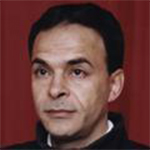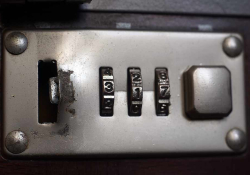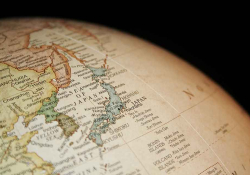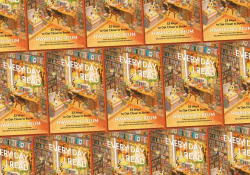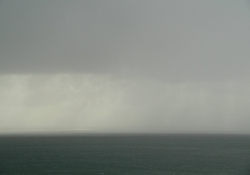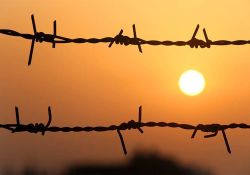Ghost
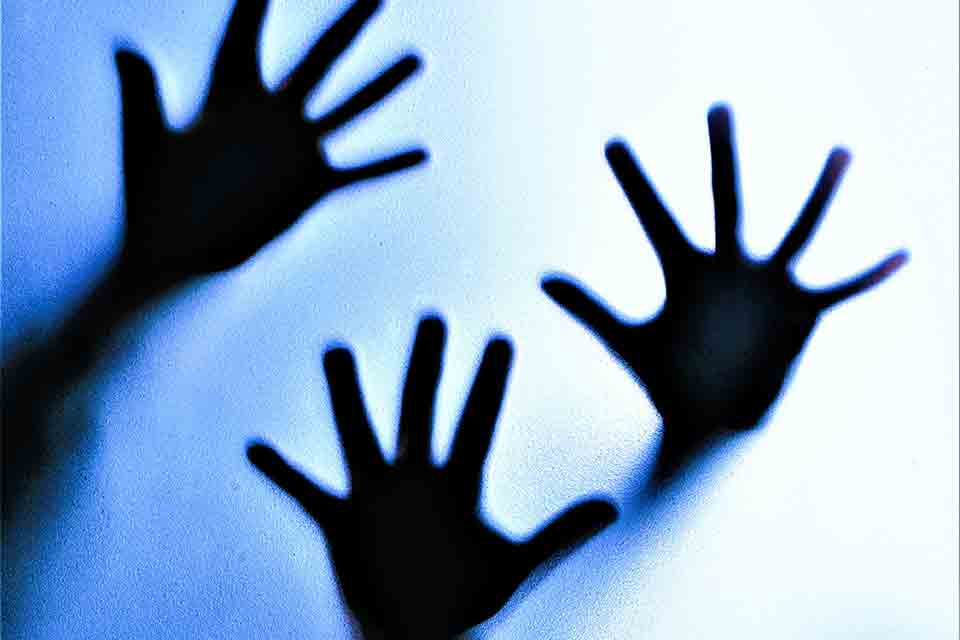
“Let the world know that we are ghosts indeed—since ghosts cannot be extinguished, nor can they be defeated.”
I’m a man who’s been turning into a ghost with the passing of the days. My only friends are books and the window. I read Darwin in bed, the clouds in the window, and Einstein in the living room. I get depressed whenever I meditate for more than fifteen minutes. I have no work or ambition. I collect a salary based on a previous job, and while away my time dredging up memories.
I’m a man who’s been turning into a ghost with the passing of the nights. I sleep during the day, and at night I challenge the Lord.
I’m a man who’s been turning into a ghost with the passing of time. My real friends have emigrated or died. I buried my mother two years ago, and I’ve never gone to visit her.
I’m a man who’s been turning into a ghost with the passing of time.
I’m a man who’s turning into a ghost with the passing of the years. I sold the family home to a cigarette salesman and frittered the money away. Long ago my roots were scattered to the ends of the earth, and one after another, my siblings are dying in faraway places.
I’m a man who’s been turning into a ghost with the passing of the days: a ghost in the mirror, a ghost on the bed, a ghost in the living room, a ghost on the chair, a ghost among the books, a ghost in the window, the most ghostly ghost of the war. I’m a man who’s been turning into a ghost as I become less and less defined. A ghost, a gosth, a tsohg, who’s ashamed to ask for help.
A ghost who at the age of thirty-five—that is, thirty years and tens of thousands of martyrs and detainees ago—had five well-functioning senses and seventy-five kilos of flesh, tissue, and muscle covering his frame—which qualified him perfectly to write about himself as a ghost, even though at the time he was the farthest cry from a ghost.
Now, by contrast, on January 7, 2025, with two hundred thousand martyred, wounded, amputees, missing, widows, widowers, orphans, and detainees, he’s become a bona fide ghost: a ghost in the streets, a ghost under the tents of Mawasi, a ghost in search of canned peas past their expiration date, a ghost that dreams of a truce even though he’s 3,288 kilometers from the war.
Now that Gaza’s entire civilian infrastructure—from paved roads to schools, banks, universities, hospitals, mosques, churches, wells, civil society institutions, football stadiums, and animal shelters—has been crushed by MK-84 bombs and booby-trap explosives, rendering 95 percent of its approximately 2.5 million inhabitants without homes or anything resembling a home, he’s becoming a bona fide ghost: a ghost that’s lost twenty kilograms and whose spine has bowed beneath the burden of every moment endured in exile.
A ghost once made of rhyme and meter who’s now a ghost of flesh and blood.
A ghost who sleeps four hours a day.
A ghost who doesn’t go near a book.
A ghost that follows events around the tragedy-laden clock.
A ghost who weeps every time he watches a video clip.
A ghost who’s turned invisible even in broad daylight on the streets of Antwerp, where he came as a refugee in hopes of securing some remnant of a future.
Beneath his native sky on Gaza’s south coast, he has a large family of ghosts. Two of them are his married daughters, May and Maya, who together have given birth to six beautiful girls, and whom Belgium denied permission to immigrate on a family-reunion visa.
If by some miracle they can get an internet connection for a minute or two, they tell him the latest news before the line cuts off. They told him yesterday that their little girls had been asking for riz bi-haleeb—Arab-style rice pudding—but that a kilo of sugar was selling in the market for forty-two dollars, and that they had no money, besides which, there was no milk in Mawasi, or Jabalia, or Beit Hanoun, or Beit Lahia.
They wept over the fact that their little girls had turned into ghosts: so anemic and undernourished that when they stood up, they would get dizzy and fall down.
May and Maya had also turned into ghosts.
And then there were his three sisters, two of them housewives and one a schoolteacher. The oldest had been shot in cold blood during the war, the middle sister had died in a bombing, and the third—the schoolteacher—had lost the hand she used to hold the chalk, and all she had left of her house was rubble.
Ghost!
Ghost!
Ghost!
You who were crucified on a tree, the Palestinians have all turned to ghosts at the turn of this third millennium!
Ghosts!
Ghosts!
Ghosts!
All of them, O crucified one! From those who tremble beneath an F-35, to those who watch the images beneath the skies of New York City, Antwerp, or Bogotá.
All of them, O crucified one!
Every newborn: a ghost.
Every ninety-year-old: a ghost.
The men: ghosts.
The boys: ghosts.
The girls: ghosts.
The buildings: ghosts.
The fields and orchards: ghosts.
Chicken coops and cattle pens: ghosts.
Embryology labs, fertility clinics, test-tube babies, liquid-nitrogen storage tanks, and five thousand fetuses: ghosts.
The remains of memories: ghosts.
My whole world in Gaza has turned ghostly. Over the fifty-two years I lived there, it started slipping from people’s grasp like a sudsy bar of soap. (By the way, no one’s had any soap or shampoo in Gaza for ten months now.)
So, now I am an actual ghost, not in some figurative or metaphorical sense, far from plays on words or language games: I’m a ghost that suffers from diabetes, a stomach ulcer, high cholesterol, and the fate of a storm-swept people.
A ghost that, with a single burst of the imagination in this ink-fueled moment, might break the law of gravity and go soaring through Flanders’ skies.
A ghost, a ghost, a ghost . . . like 2.4 million ghosts minus two hundred thousand by virtue of death or disablement, and fifteen million in the diaspora and what remains of the homeland.
A ghost, a ghost, a ghost . . . like the ghosts of millions of good-hearted souls who have come out in noble demonstrations of solidarity and compassion on both sides of the Atlantic.
Ghost, ghost, specter, shade . . . O Lord of hell, give me the distinguishing feature of all ghosts: that of not existing on this planet.
My ghosts wish for death there, so why shouldn’t I wish for it here? The people of ghosts who remain there desire rest, so why shouldn’t their ghost in exile wish for it as well?
How many times have I pleaded with you to help them, but you didn’t listen? How many times have I bared my soul to you on frigid Antwerp nights?
How many times did I cry out to you from these earthquake-rent skies, “Have mercy!” But you paid no attention.
Tell me: are you, despite being omnipotent (as a transcendent deity must be), unable to toss some crumbs to a child, himself a ghost that goes looking in garbage dumpsters for what he and his family need to survive the day?
Who are you, my Lord, to the old man who watches food being parachuted to earth in the distance with the wistful sigh of someone who has lost confidence in the flesh? Who does he have now but you?
Who are you to a man who—by some inexplicable coincidence, the sole survivor from his extended family of ghosts—cries for help, saying, “I’m here, over here! Under the rubble of the neighbors’ house. Come get me! I can’t breathe. Please! I need help! I need oxygen, people!”
Then his voice fades out until it’s gone.
Who are you, O Lord, you who forsook the ghost that belonged to a girl in her last year of medical school and needed an urgent blood transfusion? Copious amounts of blood had been spilled on the beds and the tile floors of the hospital rooms and corridors, while other ghosts were likewise hovering on the edge, somewhere between the end of the physical realm and the beginning of the metaphysical. But there was no blood in the blood bank.
Who are you, Lord, you who forsook the ghost that belonged to a beautiful college student whose uncle, a physician, was forced to amputate her leg above the knee with a kitchen knife while besieged by shelling in a half-demolished house?
“Lema sabachthani? Why have you forsaken me?” *
Why did you forsake the ghost of a young boy fleeing from random rocket fire and the sight of slain children at his feet beneath billows of black dust? Uncomprehending, he was left unable even to whisper a word for seventy-four days.
Why did you forsake the ghost of a pregnant young woman who, on the instructions she had received from her doctor during a previous pregnancy, had gone for a walk on the nearby seashore under the terror of machine-gun quadcopters, only to receive a bullet to her liver?
Who are you, my Lord?
The saying goes, “A friend in need is a friend indeed.” So, have you spurned your friends, the descendants of the one crucified on a tree?
What are the ghosts of our long-suffering women to do when they have no water? They dream of a warm bath that would enable them to cleanse their bodies of menstrual blood and molecules of poisoned air, with dust clinging to the roofs of their mouths, just as it clings to the roofs of their tents.
Are you, Creator of the humans and jinn, incapable of rescuing your ghosts as F-16s, F-18s, F-35s, and military drones deal with us as enemy combatants to be extinguished?
On the other hand, perhaps it’s more compassionate for them to be ghosts. After all, when ghosts are executed on Palestine’s southern shore, they must feel no pain.
Executed? Forgive me, Lord!
Forgive me, my people!
I’ve fallen into the sin of sins.
No matter how deep they wade in the blood of the twenty thousand children, the eighteen thousand women, and the countless others they have murdered, we will not be annihilated.
We’ll suffer for a long time, but we won’t disappear.
We’re not ones to surrender and raise the white flag.
Nor are the flowers that were born between cracks in tile and stone or the rocks forgotten by the Zionists and their superlative evangelical allies.
Those who have gone on resisting the most violent, brazen, and evil of invaders for a hundred years and counting aren’t about to bend the knee now.
Defeat is a luxury that is forbidden to the freedom fighter, as it has been since the dawn of history.
We will remain, like the roots of our olive trees in the mountains.
We will remain, like the roots of our olive trees in the mountains:
Deep in the soil.
Deep in the recesses of our souls and our songs.
Deep in the youthful passion of the poet and the visual artist.
Deep in the longing for return engrained in mothers’ and grandmothers’ hearts.
We cling to the legacy of our forefathers who were martyred as they struggled on the road to Golgotha.
We’ve been carrying on this struggle for a hundred years along the same road.
In the end, if NATO powers go on seeing our country as nothing but as an “altar of sacrifice,” and its people as nothing but ghosts, so be it.
Let the world know that we are ghosts indeed—since ghosts cannot be extinguished, nor can they be defeated.
Until Palestine is liberated, we will be ghosts that turn into men and women.
Ghosts that emerge from beneath the soil in every spot occupied by a Merkava tank.
Ghosts that will return someday to their original homes, rejoicing and triumphant.
May the Lord bless the ghosts.
Translation from the Arabic
*Jesus’s words on the cross: “Eli , Eli, lema sabachthani? My Lord, my Lord, why have you forsaken me?” (Matthew 27:46).

